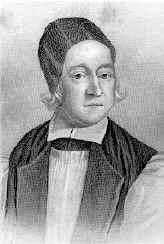Thomas Ken
Bishop and Non-Juror
21 March 1711
 Thomas Ken in the course
of his lifetime was both rewarded and punished for his firm adherence to principle.
He was born at Berkhampstead in 1637 and reared by his half-sister Anne and
her husband the well-known angler Izaak Walton. Educated at New College Oxford, he
was ordained priest in 1662 and worked first in a poor parish in the diocese of
Winchester, and then at Winchester College for ten years. He and served for a year
at the Hague as chaplain to Mary, Princess of England and Queen of Holland, niece of
King Charles II of England and wife of the Dutch King William of Orange. During this
year he publicly rebuked King William for his treatment of his wife Mary, which may
be why he was chaplain there for only a year.
Thomas Ken in the course
of his lifetime was both rewarded and punished for his firm adherence to principle.
He was born at Berkhampstead in 1637 and reared by his half-sister Anne and
her husband the well-known angler Izaak Walton. Educated at New College Oxford, he
was ordained priest in 1662 and worked first in a poor parish in the diocese of
Winchester, and then at Winchester College for ten years. He and served for a year
at the Hague as chaplain to Mary, Princess of England and Queen of Holland, niece of
King Charles II of England and wife of the Dutch King William of Orange. During this
year he publicly rebuked King William for his treatment of his wife Mary, which may
be why he was chaplain there for only a year.
Upon his return to England, he was made Royal Chaplain to King Charles II. The King had a mistress, Nell Gwyn, and for his convenience wished to lodge her in his chaplain's residence. Thomas sent the King a sharp refusal, saying that it was not suitable that the Royal Chaplain should double as the Royal Pimp. Charles admired his honesty and bluntness, and when the bishopric of Bath and Wells became available soon after, he declared, "None shall have it but that little man who refused lodging to poor Nellie!" Ken was accordingly made a bishop. When Charles was on his deathbed in 1685, it was Ken whom he asked to be with him and prepare him for death.
Under the next king, James II, brother of Charles, matters were different. James converted to Roman Catholicism, the religion of his mother, and political turmoil followed. James issued a decree known as the Declaration of Indulgence, which decreed that various public offices formerly open only to Anglicans, should thereafter be open to all persons. It was feared that the King would appoint large numbers of Roman Catholics to positions of power, and eventually transfer to them the control of the government. When the King commanded the bishops to proclaim the Declaration of Indulgence, seven of them refused to do so and were by the King's command imprisoned in the Tower of London. The people of London rioted, and the bishops were freed and carried in triumph through the streets of the city. Soon after, Parliament offered the crown to the King's daughter Mary and her husband William of Orange, and James fled into exile.
William and Mary naturally began their reign by demanding oaths of allegiance from all persons holding public positions, including the bishops. Thomas Ken and others (known as the Non-Jurors -- the older meaning of "juror" is "one who takes an oath," hence "perjurer" as "one who swears falsely") refused to take the oath, on the grounds that they had sworn allegiance to James, and could not during his lifetime swear allegiance to another monarch without making such oaths a mockery. They were accordingly put out of office.
Thomas Ken became a private tutor and spent the rest of his life in retirement. He died 19 March 1711, and is buried at Frome in Somerset. His life is usually commemorated on 21 March. During his lifetime he was known for his books of sermons. Today, he is best known for several hymns, notably:
All Praise to Thee, My God,
This Night
Awake, My Soul, and with the
Sun
Praise God, from Whom All
Blessings Flow
Acknowledgements:
Text adapted from James Kiefer's Christian Biographies,
Oremus,
Simplenet (no longer available)
Image from
Simplenet (no longer available)